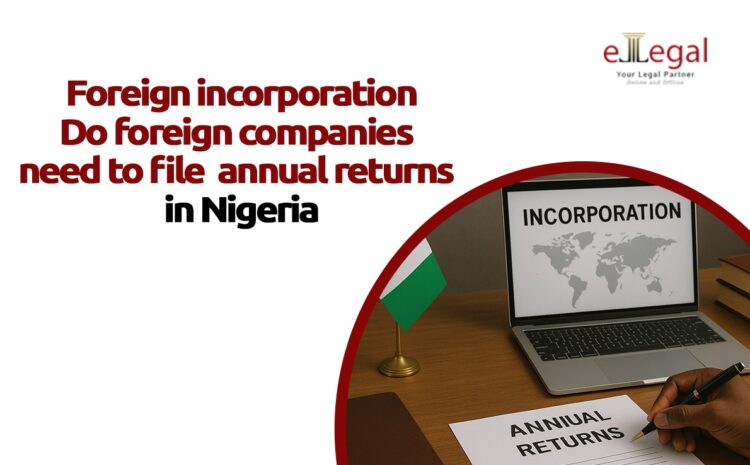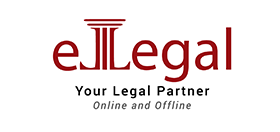
Introduction
Nigeria’s economy, as Africa’s largest by GDP, continues to attract substantial foreign investment across various sectors, including technology, energy, and manufacturing. A lot of people keep asking, ‘Can a foreigner register a company in Nigeria?’, yes, because with over 200 million people and a growing digital market, the country offers significant opportunities for international businesses seeking to expand their global footprint. However, navigating Nigeria’s regulatory landscape requires careful attention to compliance obligations, particularly regarding annual return filings. The question of whether foreign companies need to file annual returns in Nigeria is not merely academic; it carries substantial implications for legal status, financial penalties, and operational continuity. This blog examines the legal requirements, procedures, and strategic considerations for foreign entities operating in Nigeria, providing clarity on an often-complex aspect of corporate compliance.
Understanding annual return obligations is crucial for companies doing business in Nigeria seeking to maintain good standing within Nigeria’s regulatory environment. The requirement to file returns depends on several factors, including the company’s structure, level of operation, and income derived from Nigerian sources. With recent legislative changes through the Finance Act 2020 and updated Companies and Allied Matters Act (CAMA) 2020, the compliance landscape has evolved significantly.
Annual Return Requirements for Foreign Companies
Incorporated Foreign Entities
Foreign companies that have established local subsidiaries with foreign shareholders in Nigeria are subject to the same annual return requirements as local companies. These obligations include:
CAC Annual Returns: According to Section 374 of CAMA 2020, every registered entity must file annual returns with the Corporate Affairs Commission by June 30th of each year (except the year of incorporation). The filing must include: audited financial statements; details of shareholders and directors; information about the registered office address; and a statement of the company’s activities throughout the year.
Companies must use the appropriate forms based on their structure: Form CAC 10A for companies having shares (other than small companies), or Form CAC 10C for exempted foreign companies.
FIRS Tax Returns: Incorporated foreign entities must also file annual tax returns with the Federal Inland Revenue Service (FIRS). These returns should include: audited financial statements specifically for Nigerian operations; tax computation schedules based on profits attributable to Nigeria; a written statement containing the amount of profits from each Nigerian source; and completed Companies Income Tax Self-Assessment forms. The corporate tax rate is generally 30% for large companies (those with turnover above ₦100 million), with progressive rates for smaller entities.
Unregistered Foreign Companies with Nigerian Operations
Foreign companies without formal incorporation in Nigeria but with significant operations or income sources within the country still have compliance obligations:
Tax Returns: Unregistered foreign companies that meet the criteria for taxation in Nigeria (through fixed base, SEP, or other factors) must register with FIRS and file appropriate tax returns. According to Section 55 of CITA (as amended by Finance Act 2020), foreign companies deriving profits or otherwise taxable in Nigeria must file returns containing: audited financial statements; financial statements specifically for Nigerian operations; tax computation schedules based on profits attributable to Nigeria; and a statement of profits from each Nigerian source.
SEP Registration: Foreign companies with Significant Economic Presence must register for income taxes, prepare financial statements for income generated from Nigeria, determine attributable profits, and file annual tax returns with FIRS.
Withholding Tax Obligations: In cases where Withholding Tax (WHT) constitutes the final tax on transactions (typically at 5-10% depending on the service), the foreign company may not need to file full corporate income tax returns, as the obligation falls on the Nigerian entity making payment to deduct and remit these taxes.
Procedures for Filing Annual Returns
CAC Filing Process
The procedure for filing annual returns with the Corporate Affairs Commission has been streamlined through digitalization, allowing for online submission through the CAC portal. The process typically involves:
Preparation of Documents: Companies must gather required documents, including audited financial statements certified by both a director and the company secretary; reports from auditors and directors; and evidence of payment of necessary fees. For foreign companies, these documents may need to include both global financial statements and those specifically pertaining to Nigerian operations.
Completion of Appropriate Forms: Based on the company type, the appropriate form must be completed (CAC 10A for companies with shares, CAC 10C for exempted foreign companies). These forms require information about: branch addresses (if any); particulars of proprietors/partners; corporate partners (if any); turnover and net assets; and authentication by an authorized officer.
Submission and Payment: The completed forms and supporting documents are submitted through the CAC portal along with payment of the required fees. Late filings incur penalties for the first month and for each subsequent day of default.
Penalties for Non-Compliance with Filing Requirements
Failure to meet annual return obligations can result in significant consequences for foreign companies operating in Nigeria:
Financial Penalties: Both CAC and FIRS impose substantial financial penalties for late filing or non-compliance. For CAC annual returns, companies face an initial penalty of ₦5,000 for the first month and ₦500 for each subsequent day of default. For tax returns, FIRS imposes ₦25,000 for the first month of default and ₦5,000 for each subsequent month. Additionally, underreporting of income attracts a penalty of 10% of the unpaid tax plus interest charges.
Legal and Operational Restrictions: Companies that fail to file annual returns may be classified as “inactive” on the CAC register, which can damage credibility with partners, customers, and investors. Additionally, these companies lose access to post-incorporation services from CAC, including obtaining certified true copies of documents, making changes to directorship or share capital, and filing other statutory documents. In extreme cases, persistent non-compliance can lead to striking off the company’s name from the register, effectively ending its legal existence in Nigeria.
Reputational Damage: Beyond formal penalties, failure to comply with filing obligations can damage a company’s reputation and credibility in the Nigerian market. This can affect relationships with regulatory authorities, business partners, and customers. Many government and private sector contracts require proof of updated annual returns as a precondition for bidding, meaning non-compliant companies may be excluded from valuable business opportunities.
Practical Compliance Tips for Foreign Companies
Navigating Nigeria’s annual return requirements requires proactive planning and attention to detail. Foreign companies should consider these practical tips:
Maintain Accurate Records: Keep detailed records of all Nigerian operations, including financial transactions, contracts, and correspondence with local partners or customers. This documentation is essential for accurately determining attributable profits and preparing required returns.
Engage Local Professionals: Given the complexity of Nigerian regulations and frequent updates, engaging local legal and accounting professionals like eLegal Consultants is highly advisable. We the experts, can provide guidance on compliance requirements, assist with the preparation and submission of returns, and represent the company before regulatory authorities.
Conclusion
Foreign companies operating in Nigeria, whether through incorporated subsidiaries or directly from abroad, face clear obligations regarding annual return filings. These requirements extend beyond simple corporate formalities to include detailed tax returns based on profits attributable to Nigerian operations. The introduction of the Significant Economic Presence concept has particularly expanded the scope of these obligations, ensuring that even foreign companies without physical presence in Nigeria must comply if they meet certain threshold requirements.
Proactive compliance with annual return requirements is not merely a legal obligation; it represents a commitment to good corporate citizenship and sustainable business practices in Nigeria. By understanding their obligations, maintaining accurate records, engaging professional assistance, and filing returns promptly, foreign companies can avoid penalties, maintain their good standing, and build a positive reputation in Africa’s largest economy. As Nigeria continues to refine its regulatory framework to accommodate evolving business models, particularly in the digital economy, foreign companies must remain vigilant about changes that may affect their compliance responsibilities.
Ultimately, while Nigeria’s regulatory requirements may seem complex, they represent a normal part of operating in a sophisticated emerging market. With our proper planning and professional guidance, foreign companies can successfully navigate these requirements and focus on leveraging the substantial opportunities that Nigeria offers. Contact us for a free consultation.





